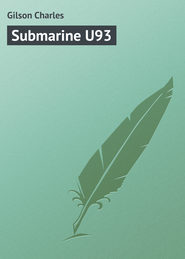По всем вопросам обращайтесь на: info@litportal.ru
(©) 2003-2025.
✖
Treasure of Kings
Настройки чтения
Размер шрифта
Высота строк
Поля
And Rushby was proved to be in the right. We ran into a great calm as I have said. The sea was like glass; and though the sun was blotted out by a steam-like fog, the heat was so intense that we went about the deck in naught but vests and trousers, with the sweat dripping from our finger-tips.
Without a doubt, the crew suffered for lack of lime-juice; some broke out with a horrid skin disease. And then the news came that the tinned meat had all gone bad, and we were forced to live on salted ling-fish, so that we went thirsty all day long.
It was Ebenezer Hogg, the negro cook, who started all the trouble. He was a long, raw-boned Jamaica man, who had cut a figure in the prize-ring in his younger days. He had never forgiven the skipper for a blow across the mouth because the cabin potatoes had not been properly peeled, though this was the work of Ah Chin, the cook's mate, a half-daft Canton Chinaman, who would fire off crackers at all hours of the night, in honour (I suppose) of the heathen gods he worshipped.
Hogg told his shipmates he cared not a "dime with a hole in it" for James Dagg or any man. They had no food fit to eat, so they might as well help themselves to the ship's grog, to keep-as he described it-body and soul together.
Rushby-as his duty was-warned the captain of what was coming; but Dagg, who had been losing heavily at cards to Mr. Forsyth, only abused the boatswain for his pains, and said that he himself was the best judge of such matters and would know how to deal with insubordination.
And that night the crew, led by Hogg, the nigger, broke into the storeroom with a hatchet and broached the rum casks. Within half-an-hour, they were all roaring drunk; and that was a night that I shall never live to forget.
The moon came out from the white sea-mist, as if to look down in scandalised amazement upon a scene of debauchery and violence-a round, red ball of fire, casting its rays upon the stagnant, reeking seaweed, illuminating the deck of that floating madhouse with a dull crimson glare, whereby you might see the whites of men's eyes and the glitter of the sharp blades they handled.
Dagg appeared on deck, his face livid with passion; and I could see by his walk that he, too, had been drinking heavily at his card-playing.
"What's all this?" he shouted at the top of his voice. "Understand, I'll have no monkey-tricks aboard the ship that I command."
Hogg at once squared up to him, his two fists before his face, very drunk and brazen.
"Come on, James Dagg!" he cried, with his Christy-minstrel accent. "Time yer and me settled de account."
"This here's mutiny!" exclaimed the captain.
"Dat's de right word, boss," said Hogg. "Mutiny it is."
And at that, he struck the captain with his fist, so that Dagg rolled over and over upon the deck, groaning loudly.
The fat was now in the fire. If discipline could be restored, Hogg would be hanged at the yard-arm and his body cast into the sea; and drunk as he was, the nigger knew it.
"I'm de captain of dis ship," he bellowed, "an' James Dagg's de cook."
He showed his white teeth in a grin, and then gave orders as if he had been accustomed all his life to a position of authority; and the wonder was he was instantly obeyed. Five minutes later, both Dagg and his mate were bound hand and foot; and the second mate had been locked in his cabin, where he was fast asleep. The negro went staggering backwards and forwards, from the forecastle to the poop, crying out that he it was who was Captain and his name was Admiral Hogg.
There were two spectators of this comedy, who could not be considered as partisans; and the one was William Rushby and the other was myself. The boatswain's sense of duty would have held him to the captain, had it not been for me; for, though I had no liking for any of the crew, and a feeling of positive loathing for a great brute like Hogg, I saw in the discomfiture of James Dagg and his officers some chance of my own ultimate deliverance. So that when the cook turned upon me, and caught me by the scruff of the neck, I played the card that I thought safest at the time, but which certainly lost me the trick that meant the game.
"And now, boy," said Hogg, "which way de wind blow wid you? Will you sign on to serve as cabin-steward under Admiral Hogg?"
"Why, sure," said I, having picked up something of the man's own way of speaking. "I was never a friend of Captain Dagg's, as you may have seen for yourself."
And thereupon, I looked away from the negro's grinning countenance, and straight in the black, pig-like eyes of Amos Baverstock.
If I had feared him before, I was well-nigh terrified of him then; for there was black murder in the look he gave me, and his mouth was working horribly.
For all that, he straightened his face in half a second, and turned to Hogg as calm as the sea itself.
"I'll settle with you in a moment," said he. "I've not lived more than half my life without learning how to deal with a buck nigger who's three parts tipsy. Bo's'n," said he to Rushby, pointing straight at me, "put that boy in irons."
Rushby never moved.
"Did you hear my orders?" rapped out Amos.
"I heard right enough," said the boatswain. "But I'm not here to take orders from you."
At that, the crew, who had gathered round, thinking that Rushby was with them, became bolder than ever. Knives were drawn from belts, and one of these was flourished in the face of the captain who still lay upon the deck, bound hand and foot.
"Ho!" cried Amos. "So that's your tune, is it? I see you must all be taught a lesson."
He talked with all the confidence in the world, though-with the exception of Mr. Gilbert Forsyth, who had just strolled on deck with both hands in his trouser pockets-there was no one at his back, and he faced a crowd of angry, drunken seamen who would not then have stopped short of murder.
From Rushby he turned once more to Hogg. "And so," said he, "you claim to be the captain of this ship?"
The negro glanced in his direction, but would not meet those cruel, steadfast eyes.
"If I'm not," he blurted out, "then who is de captain? Tell me dat?"
"Why, I am," roared Amos. "And what have you to say to it?"
Hogg realised he was challenged. Perhaps, under the influence of rum, he had already gone further than he meant to; but, in any case, so far as he was concerned there was no question of retreat.
"Put up your fists!" he shouted. "We fight for it and let de best man win."
He grinned from ear to ear, as, standing in front of Amos-above whom he towered by a good clear head and shoulders-he lifted his great, black fists to the level of his face. I thought that he would kill Amos with a single blow; for the one was so big and bony, and the other so frail and shrivelled up. But I did not then know Amos Baverstock.
"Come on!" cried Hogg, still grinning.
I looked at Amos, thinking to find him alarmed; but never upon the face of any man have I beheld an expression of such complete contempt.
"You black dog!" said he, with an oath.
He drew back his right hand, as if about to strike, and immediately I caught the glint of a revolver barrel in the moonlight.
There was a flash, a single loud report, and then a dull, heavy thud as the negro's great ungainly body came down upon the deck. And there he lay, full in the red moonshine, upon that tropic night, huddled and stone-dead-the black, bragging fool who had claimed to be our captain.
"And now, then," said Amos, as cool as ever, turning to the crew, "is there any man else who would like to command this ship?"
CHAPTER VII-AND AM MADE TO PAY FOR IT
And that was the end of the mutiny on board the Mary Greenfield. The match was struck by a negro; the flames were fed with rum; and the fire flared up, just to be stamped out by the one strong man on board.
Amos at once released both the captain and his mate; whereupon Dagg treated the crew to a long-winded, high speech upon the subject of what he would do, if such insubordination occurred again; but as he had done naught during the crisis, but to get knocked down the moment he opened his mouth, there were few of his audience who were not laughing up their sleeves.
I have told the full story of the disturbance, to illustrate the character of Amos Baverstock. I have yet to write of the sequel to the trouble, which more nearly concerned myself.
For Amos was as good as his word, and made short work of William Rushby and of me. Though the crew had been bound over to keep the peace, as you might call it, admonished to behave themselves in future, the boatswain was not only degraded of his rank, but forthwith cast into irons.
As for myself, I was led before a kind of tribunal, assembled in the saloon. Captain Dagg, Amos Baverstock, and Joshua Trust were my judges; and a strange triumvirate they made, Amos chewing his black cigar, and all three seated before their glasses of grog, with their greasy playing-cards scattered before them on the table.
"Boy," said Dagg, "you joined in a mutiny. Do you know that, you whelp? Do you know what it means?"








